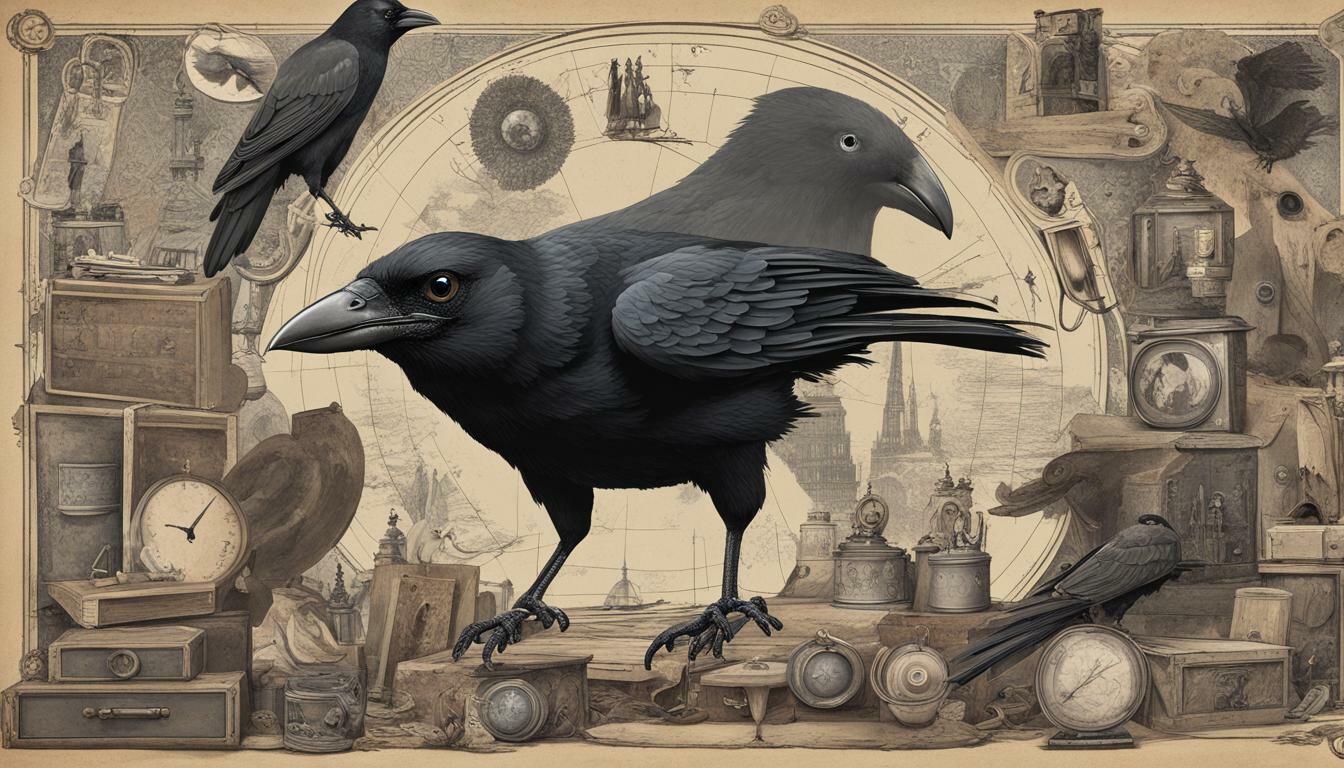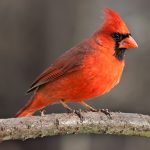Have you ever wondered about the intelligence of crows? These birds are known for their problem-solving skills and their ability to adapt to various situations. But, do crows remember faces? Can they recognize and remember human faces like we do?
Avian recognition is a fascinating topic that has captured the attention of many researchers. Crows are one of the most intelligent bird species, and their cognitive abilities are impressive. In this article, we’ll explore the world of crow intelligence and delve into the concept of facial recognition in birds.
Key Takeaways:
- Crows are highly intelligent birds with impressive cognitive abilities.
- Facial recognition is a critical skill for social interactions, survival, and foraging strategies in crows.
- Research has shown that crows are capable of recognizing and remembering human faces.
The Fascinating World of Crow Intelligence
When it comes to cognitive abilities, crows are among the most intelligent birds on the planet. These black birds have a remarkable memory, problem-solving skills, and adaptability that allow them to thrive in various environments.
One of the most impressive aspects of crow intelligence is their ability to use tools. They have been observed using sticks to extract insects from tree bark, and even making hooks from wire to retrieve food from small spaces. This level of problem-solving indicates a high level of cognitive ability that is unique among birds.
Crows also have an incredible memory. They can remember human faces for years, distinguishing between friendly and hostile individuals. Their visual memory allows them to recognize landmarks and forage for food more efficiently.
Furthermore, crows are able to adapt to new situations quickly. They have been known to change their behavior in response to environmental changes, such as the introduction of new predators or changes in food sources. This adaptability demonstrates a high level of intelligence and cognitive flexibility.
In conclusion, crows are not your average bird. Their cognitive abilities, including memory, problem-solving, and adaptability, set them apart from most other avian species. As we delve deeper into the world of crow intelligence, we can gain a greater appreciation for these remarkable birds and their place in our natural world.
Understanding Avian Facial Recognition
Facial recognition is a complex ability that plays an essential role in social interactions among individuals in various species. Among the avian species, crows possess a remarkable aptitude for facial recognition, which enables them to identify individuals and respond accordingly. Research on facial recognition in birds has shown that crows can distinguish between familiar and unfamiliar individuals, even after long periods of time. This ability is attributed to their visual memory, which is highly developed and can retain details even after a considerable period of time.
Crows and other birds are capable of recognizing various visual stimuli, such as landmarks, objects, and patterns. However, facial recognition is a much more complex task that involves integration of multiple sensory cues such as the appearance, movement, and behavior of the target. This ability is not only important in social interactions but also in foraging strategies, as it allows crows to remember which individuals are likely to offer food or which areas are rich in food sources.
Studies on crow visual memory have revealed that these birds can recognize individual humans, even those who have interacted with them in the past. This is evident in experiments where researchers wore different masks while capturing and handling crows. The crows were able to differentiate between the different masks, indicating that they recognized the faces behind them.
Furthermore, research has shown that crows can remember human faces for long periods, even up to several years. This ability is critical in their survival, as it enables them to identify humans who pose a threat or offer food. In addition, crows can transmit this information to their offspring and other members of their social group, enabling them to learn from each other’s experiences and enhance their survival strategies.
In summary, crows possess a remarkable ability for facial recognition, which is attributed to their well-developed visual memory. This ability plays a crucial role in their social interactions, foraging strategies, and survival. Research on facial recognition in crows offers insights into the cognitive abilities of these birds and their potential for adaptation to various environments.
Research on Crow Facial Recognition
Crows possess remarkable intelligence, and their facial recognition ability has been the focus of numerous studies. Researchers have conducted experiments to understand the cognitive abilities of crows, particularly their visual memory and ability to recognize and remember faces.
In one study, researchers wore masks while capturing crows for banding. After being released, the crows avoided the researchers wearing the same masks, demonstrating their ability to remember and recognize faces. Another study found that crows were able to distinguish between familiar and unfamiliar human faces, even after a year had passed.
| Study | Findings |
|---|---|
| Johns Hopkins University | Crows can remember human faces and hold grudges. |
| University of Cambridge | Crows have the ability to distinguish between familiar and unfamiliar human faces. |
These studies have shown that crows possess a high level of intelligence and have the ability to recognize and remember human faces. The implications of this research are significant, as it provides insight into the behavior and social interactions of crows in their natural environment.
Understanding facial recognition in crows can also have practical applications in areas such as conservation and agriculture. For example, using facial recognition technology, farmers can identify individual crows that are causing damage to their crops and implement targeted methods to deter them.
As research in this field continues to advance, scientists hope to gain a better understanding of the complex cognitive abilities of crows and how they utilize facial recognition in their daily lives.
The Significance of Crow Facial Recognition
Facial recognition plays a crucial role in the lives of crows. This ability aids in their social interactions, survival, and foraging strategies. Crows use facial recognition to identify individual humans and other animals, enabling them to distinguish between friendly and hostile beings. This is particularly important in urban areas, where crows have adapted to live in close proximity to humans.
Studies have shown that crows may even react differently to individuals based on their past interactions with them. For example, if a human has previously shown hostility towards a crow, that crow may remember their face and avoid them in the future. This highlights the impressive memory capabilities of these birds.
Crows also use facial recognition to identify other crows. By remembering the facial features of their flockmates, they are able to maintain social hierarchies and avoid conflicts. This is particularly important during mating season when fights over mates can break out.
Furthermore, facial recognition is crucial for foraging strategies. Crows are known to cache food in various locations to ensure a steady supply during times of scarcity. By recognizing the faces of other crows, they are able to protect their food caches from potential theft.
Overall, the ability of crows to remember and recognize faces has significant implications for their behavior and survival in the wild. It is a testament to their incredible intelligence and adaptability.
Implications and Applications of Crow Facial Recognition
While the ability of crows to recognize human faces may seem like a novelty, it has implications that extend far beyond mere curiosity. Understanding the cognitive abilities of crows, including their facial recognition capabilities, can have significant implications for a variety of fields.
One area of particular interest is conservation. By studying the behavior and intelligence of crows, researchers can better understand how these birds interact with their environment and other species. This knowledge can help inform conservation efforts and ensure the long-term survival of these remarkable creatures.
Additionally, the study of crow facial recognition can have implications for understanding human-animal interactions. By recognizing and responding to human faces, crows are demonstrating a level of social intelligence that was once thought to be unique to humans and other primates. By better understanding the behavior and cognitive abilities of crows, we can gain a deeper insight into the nature of animal consciousness and communication.
Finally, the study of crow facial recognition can have practical applications for a variety of industries. For example, understanding how crows are able to recognize and remember faces can inform the development of new technologies for facial recognition and biometrics. Additionally, the study of crow intelligence more broadly can inform fields such as robotics and artificial intelligence, as researchers look to nature for inspiration in creating intelligent machines.
Overall, the implications and applications of crow facial recognition are vast and far-reaching. By studying the intelligence, behavior, and cognitive abilities of these remarkable birds, we can gain a deeper understanding of the natural world and our own place within it.
Future Directions in Crow Facial Recognition Research
While research on crow facial recognition has yielded fascinating insights, there are still many unanswered questions. Scientists are just beginning to scratch the surface of understanding the cognitive abilities of crows and how they relate to their facial recognition skills.
Potential Areas for Further Investigation
One area for future research could be to explore the neural mechanisms behind crow facial recognition. By examining the brain activity of crows when they are presented with familiar and unfamiliar faces, researchers could gain a greater understanding of how their visual memory works.
Another potential avenue for investigation is to study how crows’ facial recognition abilities change over time. By tracking the same group of crows over a longer period, researchers could assess whether their ability to remember faces improves or deteriorates as they age.
Implications for Future Research
The findings from research on crow facial recognition have broad implications for understanding animal cognition and the evolution of intelligence. As such, future research in this area could provide insights into how the brains of animals have adapted to survive and thrive in their environments.
Moreover, continuing to study the cognitive abilities of crows and other corvids could help us better understand the factors that contribute to the evolution of high intelligence in animals. By examining how problem-solving skills, memory, and visual recognition abilities have evolved in different species, we can gain a more complete picture of the evolution of intelligence.
Conclusion
Crow facial recognition is a fascinating area of research that has the potential to yield many insights into the cognitive abilities of birds. While much remains to be discovered, the findings so far have shown that crows are capable of remarkable feats of visual memory and recognition. As research in this area continues, we can expect to gain a deeper understanding of the fascinating world of crow intelligence.
Conclusion
So, do crows remember faces? The answer is a resounding yes. Through extensive research, we now know that crows possess impressive cognitive abilities, including the ability to recognize and remember human faces. Their aptitude for facial recognition has significant implications for their social interactions, survival, and foraging strategies.
The study of crow intelligence is a fascinating one, shedding light on the complexity of animal cognition. As we learn more about the cognitive abilities of crows, we can gain a deeper understanding of the natural world around us.
Further research in this field is crucial in helping us unlock the mysteries of avian intelligence. By continuing to explore the cognitive abilities of crows and other birds, we can gain insights into the mechanisms behind animal behavior and find new ways to protect and conserve our natural world.
Overall, the study of crow intelligence is a reminder of the incredible diversity and complexity of life on our planet. By recognizing and appreciating the cognitive abilities of crows, we can gain a deeper appreciation for the natural world and all its wonders.
Do Crows Eat Dead Animals?
Crows are known to be opportunistic scavengers in the animal kingdom. They are attracted to carrion, and do crows eat carcasses of dead animals? Yes, they do. Crows play a crucial role in maintaining ecological balance by cleaning up dead animals, aiding in the decomposition process, and preventing the spread of diseases.
FAQ
Q: Do crows have facial recognition abilities?
A: Yes, crows have been found to possess remarkable facial recognition abilities.
Q: How do crows recognize faces?
A: Crows use their highly developed visual memory to recognize and remember faces.
Q: Why is facial recognition important for crows?
A: Facial recognition is crucial for crows in their social interactions, survival, and foraging strategies.
Q: What are the implications of crow facial recognition?
A: Crow facial recognition has potential applications in areas such as conservation and understanding human-animal interactions.
Q: What are the future directions in crow facial recognition research?
A: Future research in crow facial recognition will focus on unanswered questions and areas that warrant further investigation.











